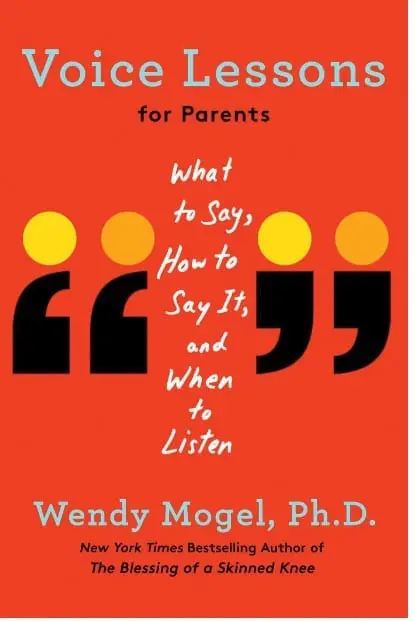Clinical psychologist Wendy Mogel is known for The Blessing of a Skinned Knee and The Blessing of a B Minus, her books on avoiding the trap of overparenting. This spring, she has a new book out, Voice Lessons for Parents, in which she gives parents practical ways to transform their communications—and relationships—with their kids.
Family Communication Tips With Wendy Mogel, Ph.D.
Q: Why did you decide to write this book now?
Mogel: Most parents are perfectly fine communicators—unless they’re talking to their children. The minute they started talking about interfaces with their kids, their voices and posture changed so dramatically. The way they spoke changed so much—and I would say that I wouldn’t listen to them either if they talked to me that way.
They sounded indignant, frightened, and unconvincing. It was clear that what happens is that it turns into sibling rivalry between the parents and the child. The children just tune out the parent or it turns into a deposition, and then a trial, and the child wins. So much of this is unconscious, but parents tend to jab their fingers and point at the child.
Q: In your book you talk about teenagers as the “only being with the power to nearly kill you yet also leave you humbled, more self-aware and possessing of some authentic wisdom.” How can parents move towards self-awareness and wisdom?

Overbearing Parents
Q: How has parenting changed over the years?
Mogel: We used to have a romantic version of parenting—the kids just went out the door and didn’t come back until dark in the summer. Now, kids live in a Supermax prison where they are being watched all the time. Because of technology, they kind of walk around with a convict’s bracelet around their ankle. There is so little privacy and freedom. Parents have far too much information. The school portals—where parents can see every assignment, test, and grade, often before the kids see it—gets them involved in a very sticky way.
Q: What would you say to these overbearing parents?
Mogel: Good, effective parenting that will result in resilient, resourceful, self-reliant, exuberant children will feel like neglect. This is how it is supposed to be; I’m sorry. He is not going to admire, like, or appreciate you right now. He is trying to separate from you, build a set of skills, identify with a good peer group—and if you want to worry you can, but I’m not going to. The kids are quick, flexible, open-minded, and original. Watch before you step in or try to take over.
The Blessing of a B Minus
Q: Why do parents freak out about small things like their teen getting one B-?
Mogel: Parents are kind of down the rabbit hole of dread about every single grade—even on a quiz—predicting their child’s whole future. A B- means there will be no future; the child is doomed.
I think this is a displacement from our collective feeling of anxiety about the unsettled state of the economy, the daunting swift changes in technology, our own mortality. There are all these things we have no control over, so parents focus in on a very narrow, concrete way on what defines failure, which in some cases is a slight look of unhappiness on their child’s face.
Q: When your teen texts you with what they think is an urgent question, how should you respond?
Mogel: See if you can be more involved with the process than the product. Ask the child, “What have you considered? What is your plan? What ideas do you have?” before you step in with the solution or guidance or going over their head to get another adult involved.
Q: What’s your top advice for parenting teens?
Mogel: When things start getting heated, just stop and listen to the sound of your voice. Say to a teenager that you need to think something over a little bit—instead of trying to just get it over with—and then really get back to them. Don’t hope it blows away. This is about moral integrity, which is something you really want them to develop. You need to demonstrate it.




